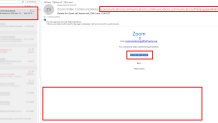With California's stay-at-home order, millions of people are using technology to stay connected. One of the most common ways is through video platforms such as Zoom or Google Meet, but scams are now imitating these invitations.
"We've gotten very used to it," said Eva Velasquez of the Identity Theft Resource Center. "We've gotten all these Zoom invitations on our calendar and our in-boxes, so, of course, [scams] are going to take advantage of that."
Velasquez said the emails show up in your e-mail box and appear to invite you to a Zoom or other video call but instead take you to a malicious website where your personal information will be at risk. One reason this scam is growing in popularity is because people are not as familiar with the virtual software.
"We have so many folks who are new to working from home and not used to using these platforms," Velasquez said. "It's going to be very hard to tell the difference."

There are a few signs the e-mail invite might actually be a scam, according to the Identity Theft Resource Center. The clearest indication is if the invitation was unexpected.
"If you don't know what this meeting is for, or who scheduled it, then you have to assume it's a scam," Velasquez said. "Go back to that source and verify it through some other means. Don't click the link, don't call the phone number."
Recipients should also hover their cursor over the link instead of clicking on it. That way you can see the true website that the link is taking you to. Make sure to check the original web address. In a statement, a Zoom representative told NBC 7 Responds that there are three web addresses that may appear in a legitimate invitation.
- Zoom.us
- Zoom.com
- Zoom.com.cn
The rest of the statement said:
“Users across all services and technology platforms should be cautious with e-mails or links received from unknown senders, and they should take care to only click on authentic links to known and trusted service providers. Zoom users should be aware that links to our platform will only ever have a zoom.us, zoom.com or zoom.com.cn domain name. Prior to clicking on a link, users should carefully review the URL, being mindful of lookalike domain names and spelling errors.”
Local
Velasquez said that scams may also appear to come from other popular video calling sites, such as Google Meet.
"If you can't figure out who the source of that invitation is, then you are much better off just ignoring it," Velasquez said. "Please don't click on any of the links or the invitation until you verify that it's legitimate."



